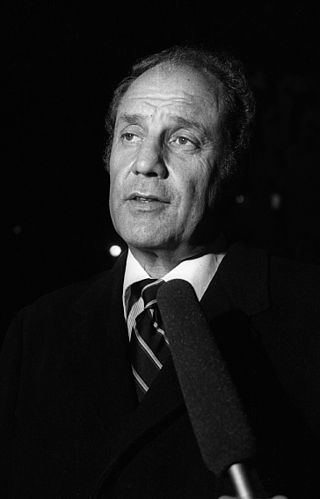
La Recoleta Cemetery is a cemetery located in the Recoleta neighbourhood of Buenos Aires, Argentina. It contains the graves of notable people, including Eva Perón, presidents of Argentina, Nobel Prize winners, the founder of the Argentine Navy, and military commanders such as Julio Argentino Roca. In 2011, the BBC hailed it as one of the world's best cemeteries, and in 2013, CNN listed it among the 10 most beautiful cemeteries in the world.

Buenos Aires is the capital city of Argentina, on the western shore of the Río de la Plata on South America's southeastern coast. "Buenos aires" is Spanish for "fair winds" or "good airs". Buenos Aires is classified as an Alpha global city, according to the Globalization and World Cities Research Network (GaWC) 2020 ranking.

Rabbi Marshall T. Meyer was an American Conservative rabbi who became a recognized international human rights activist while living and working in Argentina from 1958 to 1984, during the period of the "Dirty War" in the 1970s. He was elected by president Raúl Alfonsín to be one of the members of the National Commission on the Disappearance of Persons. After the restoration of democracy in 1983, Meyer was awarded the nation's highest honor, the Order of the Liberator General San Martín, by the new president.

The Kavanagh Building is a residential skyscraper in Retiro, Buenos Aires, Argentina. Designed in 1934 by architects Gregorio Sánchez, Ernesto Lagos and Luis María de la Torre, it is considered a pinnacle of modernist architecture. At the time of its inauguration in 1936, the Kavanagh was the tallest building in Latin America surpassing the Palacio Salvo built in Montevideo, Uruguay in 1928, as well as the tallest building in the world with a reinforced concrete structure.

Soda Stereo was an Argentine rock band formed in Buenos Aires in 1982. The band's membership consisted of singer-guitarist Gustavo Cerati, bassist Zeta Bosio and drummer Charly Alberti. During their career, the band released seven studio albums before disbanding in 1997. Soda Stereo is the best-selling Argentine band of all time, having sold seven million records by 2007.

The Compañía General de Ferrocarriles en la Provincia de Buenos Aires (CGBA) was a French–owned company, formed in 1904, which operated a metre-gauge railway network in Argentina.
Angel Kreiman-Brill was the Chief Rabbi of Chile during the 1970s and 1980s. Kreiman-Brill was a leader in interfaith outreach and cooperation, especially with Catholicism.

America Tour 1996 was a short concert tour performed by Luis Miguel during the last part of 1996 to promote his album Nada Es Igual... It only lasted for one month and it only took place at some places in South America, like Buenos Aires, Argentina in the River Plate Stadium, Santiago de Chile, Uruguay, Peru, Paraguay, Ecuador and Brazil.

Rabbi Yosef Bittón is an Argentinian-born community rabbi and the former Chief Rabbi of Uruguay.
Masorti Olami is the international umbrella organization for Masorti Judaism, founded in 1957 with the goal of making Masorti Judaism a force in the Jewish world. Masorti Olami is affiliated with communities in over 36 countries, representing with partners in Israel and North America close to two million people worldwide, both registered members and non-member identifiers. Masorti Olami builds, renews, and strengthens Jewish life throughout the world, with efforts that focus on existing and developing communities in Europe, Latin America, the former Soviet Union, Africa, Asia, and Australia. More than 140 kehillot (communities) are affiliated with Masorti Olami in Argentina, Aruba, Australia, Bolivia, Brazil, Chile, Colombia, Cuba, the Czech Republic, Ecuador, El Salvador, France, Germany, Honduras, Hungary, India, Israel, Italy, Japan, Kenya, Mexico, the Netherlands, Paraguay, Peru, Poland, Portugal, Russia, South Africa, Spain, Sweden, Uganda, Ukraine, Uruguay, the United Kingdom and additionally, more than 600 in Canada and the United States and over 80 communities in Israel. All of Masorti Olami's activities are conducted within the context of the overall Conservative Judaism movement, in close cooperation with its affiliated organizations in North America and Israel. The current executive director is Rabbi Mauricio Balter.

Abraham Skorka is an Argentine biophysicist, rabbi and book author. He is rector emeritus of the Seminario Rabínico Latinoamericano in Buenos Aires, the rabbi of the Jewish community Benei Tikva, professor of biblical and rabbinic literature at the Seminario Rabínico Latinoamericano and honorary professor of Hebrew Law at the Universidad del Salvador, Buenos Aires.

Federico Jusid is an Argentine composer who resides and works between Madrid and Los Angeles. He has written the scores for more than 60 feature films and over 70 television series.
His work includes the score for the Academy Award-winner for Best Foreign Film The Secret in Their Eyes, for which he received the nomination for the Spanish Academy Goya Award for Best Original Score.
He has recently worked with Alberto Iglesias writing additional compositions for the original score of Ridley Scott's Exodus: Gods and Kings, and he has also composed the OST for Kidnap with Halle Berry, and Happy 140. Other notable scores include The Life Unexpected, Everybody Has a Plan, The Escape, The Hidden Face, I Want to Be a Soldier, and more recently Magallanes, Getulio, The Ignorance of Blood, Betibu or Francis, Father Jorge.
On television, his most recognised work is the soundtrack for the Spanish historical drama Isabel, with whom he won several awards, such as International Film Music Critics Association (IFMCA) Award and Reel Music Award. In 2015 he made the score for the TV series Under Suspicion and The Refugees and just released the historic drama Charles, King Emperor, sequel of Isabel.
He has also composed works for concert hall premiered throughout Europe and America by recognized soloist and chamber ensembles. As a pianist and composer, he has performed and toured prestigious theaters in Europe, Asia and America. He recorded for labels BMG, IRCO, Magenta Discos and Melopea.

The Rab. Alejandro Avruj is Rabbi of the Comunidad Amijai, and Vice President of the Latin American Rabbinical Assembly of the Masorti Movement.

The A Bailar Tour was the first headlining concert tour by Argentine singer Lali in support of her debut studio album, A Bailar (2014). The tour began on April 19, 2014, in Buenos Aires and concluded in on April 25, 2016, Tel Aviv. It was the highest-grossing tour of 2015 in Argentina.

Santa Fe – Carlos Jáuregui Station is a station on Line H of the Buenos Aires Underground which opened on July 12, 2016 on already operating section of the line. The station combines with Line D at Pueyrredón station. It's located in the intersection of Santa Fe and Pueyrredón avenues, in the Buenos Aires barrio of Recoleta.

Yosef Kleiner or Iosef Kleiner is an Israeli rabbi, psychologist, actor and intellectual born in Buenos Aires, Argentina, on December 20, 1963. Between 1994 and 2020 he was the rabbi of the Comunidad Israelita Sefaradí, in Chile; Congregation Adat Shalom Emanuel in Rehovot, Israel; the Union Libérale Israélite de France (ULIF) in Paris and Congregation Moreshet Avraham in Jerusalem.
Comunidad Israelita de Santiago is a Jewish communal organization in Santiago, Chile. The organization is associated with the traditions of Masorati Judaism and the Latin-American Rabbinical Seminary in Buenos Aires, Argentina.
The Comunidad Bet El is a Conservative Jewish congregation and synagogue, located in Buenos Aires, Argentina.

Rabbi Mauricio Balter is the executive director of Masorti Olami, the international umbrella organization of the Masorti/Conservative Judaism Movement and MERCAZ Olami, the Movement's Zionist and political arm. As a representative of the Masorti/Conservative Movement, Balter is one of the 37 Directors of the Jewish National Fund and sits on the Education and Community Committee, as well as the Resource Development Committee. Rabbi Balter is founder and member of the Forum for Jewish Renewal in the Negev and founder of the Negev Interfaith Initiative Dialogue. Rabbi Balter serves as an executive member of the World Zionist Organization, a member of the board of governors of KKL-JNF, Keren HaYesod and the Jewish Agency for Israel.

The Disciplina Tour was the fifth concert tour by Argentine singer Lali. The tour saw multiple songs performed for the first time live, including those from her fourth studio album, Libra (2020) and songs belonging to her fifth studio album, Lali (2023), such as "Disciplina", "Diva" and "N5". It began on 23 June 2022 and it travelled across Latin America, Europe and Asia, concluding on 8 April 2023.


















